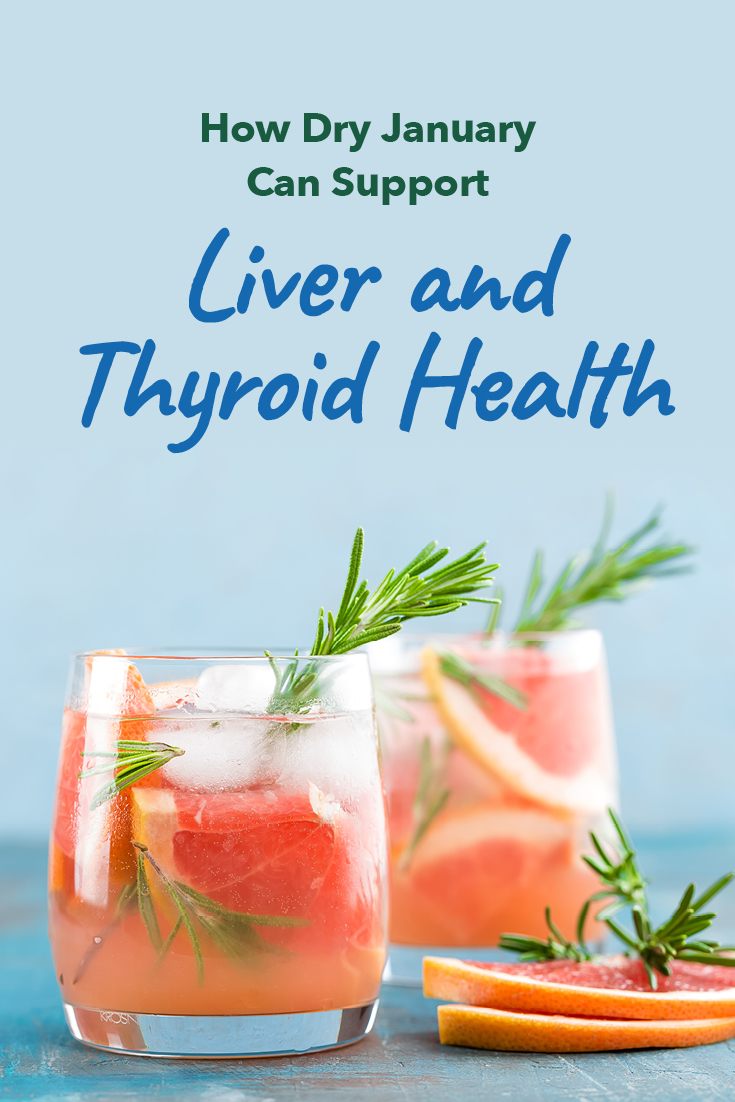Expert Advice

Acella Pharmaceuticals is partnering with Heather Procknal, NBC-HWC-CHC, to bring greater awareness to the importance of thyroid care and education. This post was sponsored by Acella Pharmaceuticals.
Disclaimer: The information provided is for educational purposes only and does not substitute professional medical advice. Consult a medical professional or healthcare provider before beginning any exercise, fitness, diet, or nutrition routine. Acella Pharmaceuticals, LLC does not endorse, promote or sponsor any products or brands mentioned in this article. The views expressed here are those of the author.
There are many benefits to taking a break from drinking alcohol. If you’re curious as to how a break can help your thyroid health and reduce symptoms, then this might be the nudge for you.
Alcohol is consumed by more than 50% of the U.S. population over the age of 18. It’s also the world’s largest risk factor for disease. Because of the profound effects it has on the endocrine system, alcohol consumption can trigger and exacerbate thyroid-related symptoms. In many ways, it’s like adding fuel to the flames.
How does alcohol effect the liver and thyroid?
The two main organs you want functioning at their best are also two of the hardest hit when you drink alcohol. They are the liver and the thyroid. With regard to alcohol, some of the liver’s functions include filtration and detoxification. It’s your liver that has to process and metabolize the byproduct of alcohol – acetaldehyde.
Think of your liver as a sponge that has to filter out everything you eat and drink. It cleans up your blood before passing it through the rest of your digestive tract.
This is why it’s crucial for your liver to be in tiptop shape to perform its more than 500 functions.
Yes, you read that correctly! Your hard-working liver has more than 500 jobs!
When your liver is bogged down with excess alcohol, fat, sugar and synthetic chemicals, it becomes sluggish, which allows toxins to build up in your body.
This bottleneck effect in the liver may contribute to:
• Chronic inflammation • Belly bloat • Weight gain • GI distress • Hormone disruption • Sleep disturbances • Interference with blood glucose levels • Depletion of nutrient reserves.
This is bad news for your thyroid health too!
Alcohol may weaken your immune system, making Hashimoto’s disease flare-ups more likely and intense.1
Some researchers in the medical community have found a correlation between immunity and alcohol consumption. They theorize that those with Hashimoto’s disease can develop an intolerance to alcohol.
This alcohol sensitivity is thought to be linked to plant-based estrogen hormones derived from some forms of alcohol, beer and wine. The estrogen in alcohol can trigger an inflammatory and immune response in people who have autoimmune disorder, such as Hashimoto’s disease. This can decrease the body’s defenses against infections and viruses, which can result in symptom flare-ups.2
Where you were once able to enjoy a few glasses of wine or a couple of mixed drinks without an issue, you may notice that you don’t “bounce back” as quickly as you used to. You may feel even more sluggish and drained after just one alcoholic drink.
This is because your thyroid health is directly related to the health of your liver and vice versa.
One of the most important thyroid-related functions that the liver helps with is the conversion of T4 to T3.
When T4 isn’t converted into T3 in adequate amounts, symptoms of hypothyroidism result.3
Again, this pattern of thyroid dysfunction can result in increased inflammation, elevated cortisol levels, nutrient deficiencies and intestinal permeability, also known as leaky gut.
Translation, you just feel horrible.
Say goodbye to the Sandman...
If you need another reason take a break from alcohol, then let’s take a look at what it does to your sleep!
If you’ve ever had a few too many drinks then you can attest to the fact that alcohol can cause sleep disturbances. Especially if you consume alcohol right before bed.
Yes, you might fall asleep faster. But you may find yourself waking in the middle of the night with difficulty falling back to sleep.
If you have Hashimoto’s disease, you may be even more sensitive to the effects of alcohol. Just one drink could result in sleep disturbances. And we all know how important a good night’s sleep is to your overall health!
Creating an optimal sleep environment will help, but having alcohol before bed can completely derail your efforts. You should aim to get between 7 to 9 hours of sleep every night to allow your body to rest, reset and recharge.4
If you’re not getting proper sleep, you may notice it in your waistline, too.
Sleep helps regulate hormones including estrogen, progesterone, cortisol, melatonin and adrenalin – all of which can impact your ability to lose weight.
Estrogen can also suppress your thyroid gland from releasing thyroid hormone. The burden of alcohol on your liver can play a role in how it processes the hormone estrogen.
If your liver cannot properly process estrogen, then it can build up within your tissues and cause an estrogen dominance, which can activate your body’s stress response. This perpetuates the cycle of stress, hormone disruption and hypothyroid symptoms.
As you can see, there is an entire network that is negatively affected by alcohol consumption. The good news is you can greatly improve your hypothyroid symptoms by eliminating alcohol from your diet.
But if quitting or taking a break from alcohol feels overwhelming, consider what you will gain from this hiatus versus what you are giving up.
Allow yourself a moment to visualize what your future self will feel like after a break from alcohol.
• How will your mind feel? • Will you feel more clearheaded and alert? • How will your symptoms change or improve? • How will you feel about your ability to manage your health and self-care? • What else will be positively affected?
Here are a few tips and strategies to eliminate alcohol.
First come up with a plan.
How long do you plan to take a break? 14 days, 1 month, 3 months or longer?
Better yet, invite someone to do this alongside you!
Check in regularly with your challenge partner or a supportive friend to help keep you accountable. Plan a reward for when you complete the challenge, so you have something to look forward to – in addition to feeling better of course!
Sometimes the simplest and most obvious things aren’t always the easiest things to do.
Out of sight, out of mind?
If you find that seeing wine, beer or other alcohol makes you want to drink, then you may want to start by removing it from your environment. Relocate it from the kitchen to the garage or to another room. Or better yet, don’t buy alcohol while you’re on a break to lower temptation.
Identify your triggers.
When you choose to drink, is there an emotional reason behind it? Are you stressed from work, your personal life or something else?
If stress is a trigger, then consider alternative activities you can do instead of drinking that will help you destress and relax.
What activities can you think of that are your “go-to” stress busters?
• Plan a spa day, massage or yoga session instead • Consider creating a relaxing environment at home • Create a peaceful oasis in your bathroom and treat yourself to a nice long soak in the tub • Give yourself a manicure or pedicure • Play with your pet or take your dog for a walk • Go outside and get some fresh air • Try out a meditation app or find some free guided meditations on YouTube
Is drinking just a habit?
Are you drinking out of habit because that’s just what you do on a Friday night?
If drinking is more of a habit, then what hobbies do you enjoy that you’d like to reconnect with?
Sometimes finding a distraction is all it takes to get you out of the drinking habit and on a healthier track. Here are some alternatives!
• Arts and crafts • Music • Reading • Writing • Cooking • Baking • Puzzles or games • Adult coloring books • Backyard gardening or container gardening • Playing an instrument or learning a new instrument • DIY projects or home improvements
How about sports or other physical activities you’ve been wanting to try out?
• Yoga • Tai chi • Dancing • Pickleball • Pingpong • Swimming • Water aerobics
Okay, you get the idea! There are lots of areas to explore if you want to shift your energy toward something new.
BONUS: The challenge of learning something new can be incredibly satisfying and rewarding too.
Here are a few fun mocktail recipes to try!
Carbonated water with a slice of lime and mint leaves or a sprig of fresh rosemary to garnish. This one is delicious and refreshing!For a more festive drink, try carbonated water with a splash of cranberry juice and a few fresh or frozen cranberries for garnish.
For a fun frozen drink, try mixing coconut water with a handful of frozen strawberries in the blender, then top it off with fresh strawberry slices or blueberries to garnish.
An easy bubbly alternative is kombucha – be sure you look for clean organic brands. This is a great substitute for sparkling wine and looks great in a wine glass.
If you do choose to take an alcohol hiatus, be sure to track your symptoms!
• What do you notice about how you feel? • Are you sleeping better? • Are you experiencing better mental clarity? • Do you have more energy throughout the day? • Are you craving less sugar? • Have you lost any weight? • Has your mood improved? • Has your skin or hair improved?
By tracking and reflecting on the benefits you experience during this break, you are encouraging yourself to continue working toward your best version of health and wellness. Cheers to you!

REFERENCES: 1. Hermann D, Heinz A, Mann K. Dysregulation of the hypothalamic-pituitary-thyroid axis in alcoholism. Addiction. 2002 Nov;97(11):1369-81. doi: 10.1046/j.1360-0443.2002.00200.x. PMID: 12410778. https://www.ncbi.nlm.nih.gov/pubmed/12410778. 2. Dipak Sarkar, Ph.D., D.Phil., M. Katherine Jung, Ph.D., and H. Joe Wang, Ph.D. Alcohol and the Immune System. Alcohol Res. 2015;37(2):153-155. https://www.ncbi.nlm.nih.gov/pmc/articles/PMC4590612. 3. Balhara Y, Sinha Deb K. Impact of alcohol use on thyroid function. Indian J Endocrinol Metab. 2013 Jul-Aug; 17(4): 580–587. doi: 10.4103/2230-8210.113724. https://www.ncbi.nlm.nih.gov/pmc/articles/PMC3743356/. 4. National Sleep Foundation Recommends New Sleep Times: - SleepFoundation.org. https://www.sleepfoundation.org/press-release/national-sleep-foundation-recommends-new-sleep-times.
Note that DTE products, including NP Thyroid®, have not been reviewed by the FDA for safety or efficacy.
IMPORTANT RISK INFORMATION, INCLUDING BOXED WARNING & INDICATIONS
Important Risk Information
Drugs with thyroid hormone activity, alone or together with other therapeutic agents, have been used for the treatment of obesity. In euthyroid patients, doses within the range of daily hormonal requirements are ineffective for weight reduction. Larger doses may produce serious or even life-threatening manifestations of toxicity, particularly when given in association with sympathomimetic amines such as those used for their anorectic effects.
- NP Thyroid® is contraindicated in patients with uncorrected adrenal insufficiency, untreated thyrotoxicosis, and hypersensitivity to any component of the product.
- In the elderly and in patients with cardiovascular disease, NP Thyroid® should be used with greater caution than younger patients or those without cardiovascular disease.
- Use of NP Thyroid® in patients with diabetes mellitus or adrenal cortical insufficiency may worsen the intensity of their symptoms.
- The therapy of myxedema coma requires simultaneous administration of glucocorticoids.
- Concomitant use of NP Thyroid® with oral anticoagulants alters the sensitivity of oral anticoagulants. Prothrombin time should be closely monitored in thyroid-treated patients on oral anticoagulants.
- In infants, excessive doses of NP Thyroid® may produce craniosynostosis.
- Partial loss of hair may be experienced by children in the first few months of therapy but is usually transient.
- Adverse reactions associated with NP Thyroid® therapy are primarily those of hyperthyroidism due to therapeutic overdosage.
- Many drugs and some laboratory tests may alter the therapeutic response to NP Thyroid ®. In addition, thyroid hormones and thyroid status have varied effects on the pharmacokinetics and actions of other drugs. Administer at least 4 hours before or after drugs that are known to interfere with absorption. Evaluate the need for dose adjustments when regularly administering within one hour of certain foods that may affect absorption.
- NP Thyroid® should not be discontinued during pregnancy, and hypothyroidism diagnosed during pregnancy should be promptly treated.
Indications
NP Thyroid® (thyroid tablets, USP) is a prescription medicine that is used to treat a condition called hypothyroidism from any cause, except for cases of temporary hypothyroidism, which is usually associated with an inflammation of the thyroid (thyroiditis). It is meant to replace or supplement a hormone that is usually made by your thyroid gland.
NP Thyroid® is also used in the treatment and prevention of normal functioning thyroid goiters, such as thyroid nodules, Hashimoto’s thyroiditis, multinodular goiter, and in the management of thyroid cancer.
Revised
10/2023
You Are About To Leave This Website
By clicking continue, this link will take you to a website to which Alora Pharmaceuticals’ Policies & Terms of Use do not apply.
